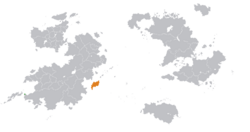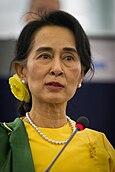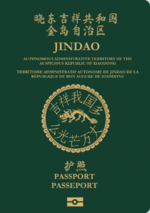Jindao–Brumah relations
 | |
Jindao |
File:Flag of Bruamah.png Brumah |
|---|---|
| Diplomatic mission | |
| Jindao Trade and Customs Office, Mandalay | Consulate of Brumah, Mandalay Court, Jindao |
| Envoy | |
| Ambassador Sun Jie | Delegate Yansen Cheng |
Jindao–Brumah relations refer to the international bilateral relations between the Autonomous Administrative Territory of Jindao, often represented internationally by Xiaodong, and the Commonwealth of Brumah. Jindao and Brumah were both part of the Empire of Gaullica – Brumah since the sixteenth century and Jindao has a concession from the Toki Sougunate in 1857 after the signing of the Tienwei Island Treaty. Unlike many other COMSED members, Brumah actively pursues extensive ties with Jindao, and the two share a positive relationship. Brumhese foreign policy in Jindao is often conducted in relation to its expansive market and liberal economic system, traits both parties share. Brumah remains an international backer of the terms of the Xiao-Estmerish Jindao Treaty.
Background
Relations between Jindao and Brumah first began to be established when Jindao was ceded to Gaullica in 1857. Due to the nature and location of the mandates, the two developed good relations throughout the 19th century as development was conducted in both at a similar rate. Trade links between Jindao and Brumah increased towards the beginning of the Great War. Both countries were placed under Estmerish mandate at the end of the war, with Brumah achieving its independence two years later in 1937. Early Brumhese governments sought special relationships with Jindao throughout the mid-20th century as an important economic ally in the region, particularly before the founding of COMSED in 1986 with the Treaty of Mandalay. When Jindao was ceded back to Xiaodong in 1996, Brumah was one of the only COMSED members that chose to continue to pursue extensive relations. The 2000s between Brumah and Jindao were marked with many cultural and economic exchanges, with over 600,000 ethnic Brumhese people living in Jindao, the largest foreign demographic in the city.
Bilateral agreements
Brumah and Jindao share many bilateral agreements, and both members are part of influential global institutions such as the Global Institute of Fiscal Affairs, headquartered in Jindao. Immigration agreements between the two countries allow for longer visa stays for Brumhese citizens and easier and smoother immigration between Jindao and Brumah. Under the Xiao-Estmerish Jindao Treaty, Jindao is permitted to control its immigration laws and has some jurisdiction over its foreign affairs (while usually being represented on the international stage by Xiaodong), which has led many Xiaodongese politicians to criticise the lenience of Brumhese entry into the city.
Political relationships and diplomatic missions
Like many COMSED members, Brumah has an official consulate in Jindao, located at Mandalay Court in the city's Metropolitan district. Most business regarding international relations with Jindao is conducted through the consulate rather than Brumah's official Xiaodongese embassy in Rongzhuo. Brumah's current delegation to Jindao is Knowleston University-graduated lawyer Yansen Cheng, who has held the post since 2013. Jindao is represented officially and diplomatically by the Embassy of Xiaodong in Mandalay, however it is also somewhat represented by the Jindao Trade and Customs Office, also in Mandalay, which serves as Jindao's non-official diplomatic presence in Brumah. The Jindanese ambassador to Brumah is Sun Jie.
Cultural
Many ethnic Brumhese people have emigrated or were born in Jindao. Jindao's 2019 census recorded 637,518 people of Brumhese descent within the city, 9.6% of its populace, and is by far the largest foreign demographic in the city. Many Brumhese people emigrate to Jindao for its lax tax laws and lavish lifestyle, with many of the Brumhese residents of Jindao owning businesses in Brumah or Jindao. Due to this, Brumah and Jindao have many cultural agreements that aim to promote respective cultures within the countries. Jindao has many Brumhese restaurants, shops, communities and various other aspects of Brumhese culture within the city. In 2000, Jindao officially raised New Mandalay, a significant community of Brumhese immigrants in Jindao, to district-level. New Mandalay is the largest overseas community of Brumhese people in the world.
Tourism
Tourism between Jindao and Brumah is frequent, with the latter to the former moreso. Jindao is one of the most-visited tourist destinations for Brumhese nationals, the destination represents a 12% of the total departures from Mandalay Galborne International Airport with frequent increments during special seasons. For over five years since the creation of the national carrier of Brumah, the route Jindao-Mandalay was one of the few international services. Jindanese and Brumhese passports are well-respected in both countries and extended visa stays are common due to existing bilateral agreements between the two countries. During the census of 2010 in Brumah, it was noted that around 6% of the Brumhese nationals held both a Brumhese and a Jindanese passport.


